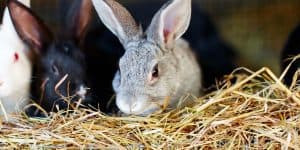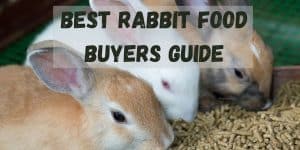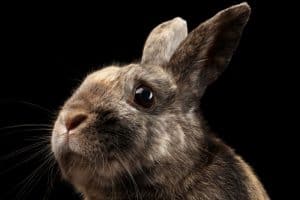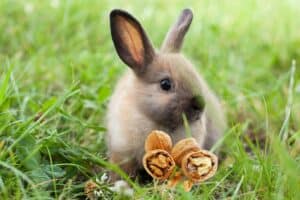What adjectives would you use to describe a rabbit? Cute, adorable, and angelic? What about ‘majestic’? No? Perhaps you haven’t met a Lionhead rabbit.
Lionhead rabbits have a fluffy, woolen mane encircling their head, neck, and chest — drawing a strong resemblance to a male lion, as the moniker suggests.
Thanks to the petite size and beautiful fur, these bunnies are extremely popular in the US as ‘pocket pets.’
But with all that wooly cuteness comes extra responsibility.
With the right handling, a Lionhead rabbit makes a playful and loyal pet. However, they can also be timid and demand plenty of space.
A decision to bring home a Lionhead rabbit is not something to be done in haste.
Here’s our complete guide, where we walk you through everything you need to know about having a pet Lionhead rabbit.
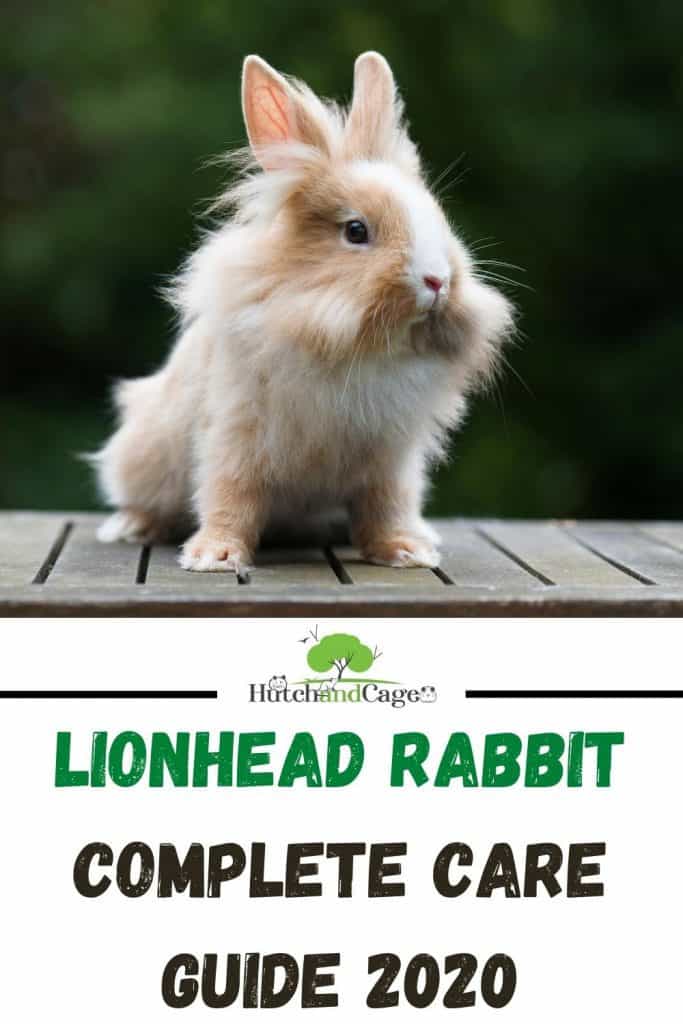
Table of Contents
Lionhead Rabbit Origin and History
Many believe Lionhead rabbits are a result of cross-breeding between Swiss Foxes and Belgian Dwarves. Now there’s no definitive timeline of when the genetic mutation originally happened, but Lionheads first started appearing in the 1960s in Belgium and France.
Because of the striking mane and a complementing physique, breeders started breeding these ‘mutations’ until they successfully secured the genes that result in a lofty mane. Ultimately, it resulted in a breed we popularly know today as the Lionhead.
The first Lionheads arrived in the US only in 2000.
The British Rabbit Council (BRC) recognized Lionhead rabbits in 2002, while the American Rabbit Breeders Association (ARBA) did so only in 2014.
Lionhead Rabbit’s Size & Body Structure
A lot of emphases is put on a Lionhead rabbit’s appearance since they are popular as show rabbits. Both ARBA and BRC have set out their standards for the appearance.
A full-grown (6+ months of age) Lionhead rabbit will usually weigh 3 ¾ to 4 pounds, whereas juniors (under 6 months) will clock in somewhere around 3.5 pounds. A Doe (female) is a few ounces lighter than a Buck (male).
As for height, Lionhead rabbits will grow up to 8-10 inches, and their ears are usually 2-3 inches high. The mane will also grow anywhere between 2-3 inches.
The head is mostly bold and broad, with a subtle roundness between the eyes. A high head mount boldly attaches the body to the head. As a result, there’s no visible neck in Lionheads. The muzzle is well-filled, and the eyes are bright.
The ears are erect and well-formed, creating a V shape when relaxed. Well-furred and rounded at the tips, the ears are also woolier midway up the length.
Some Lionheads have a flatter face than usual, owing to Brachycephaly. The flat-faced feature is usually unnoticeable but is pronounced in some.
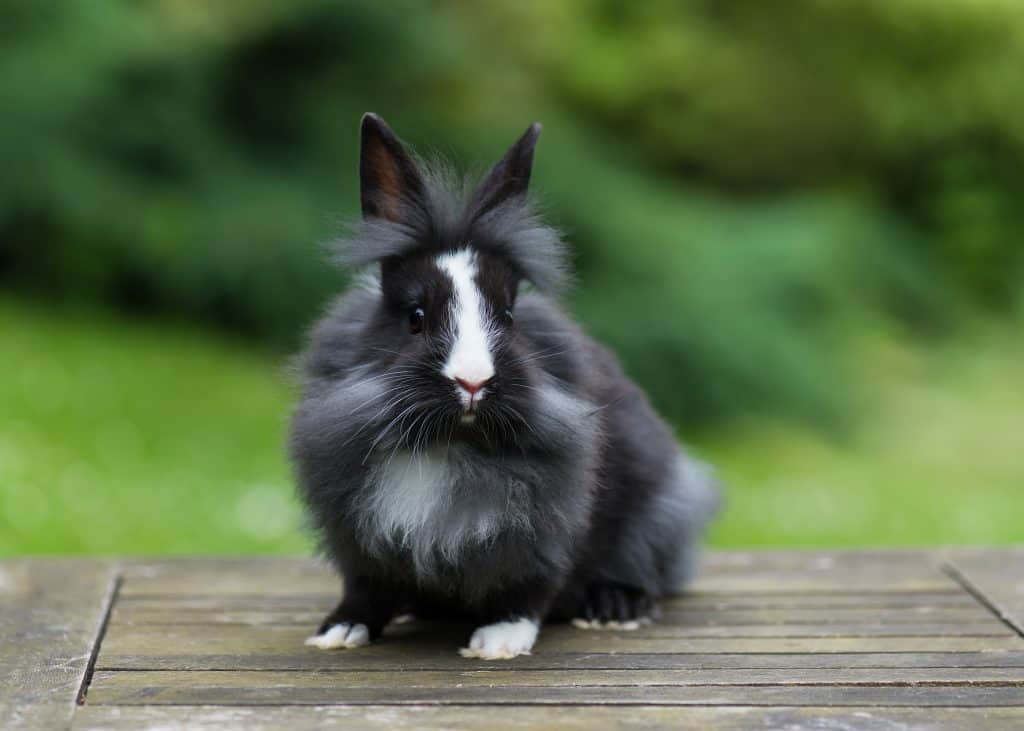
Lionhead Rabbit’s Coat and Colors
Lionhead rabbit’s renowned mane will grow anywhere between 2-3 inches. Although the mane looks wooly to the eyes, it is super soft to the touch.
Lionheads can either be born with a single or double mane.
Single-mane Lionheads only have a wispy, thin mane around their necks (not hindquarters). With age, the mane will fall off and look quite sparse.
On the other hand, rabbits with a double mane will have twice as much fur compared to their single-mane counterparts.
They’ll also have an excess of fur around the hindquarters, referred to as a ‘skirt’, in addition to thick tresses around the neck.
If you’re a first-time owner or think you’ll have a hard time managing all that fur, a single-mane Lionhead rabbit might be the preferable choice for you.
Conversely, if you’re okay with brushing your rabbit’s mane and cleaning the fallen fur daily, a double-mane rabbit will be perfect for you.
Lionheads come in more than a dozen different colors, including black, chocolate, blue point, and chestnut agouti. Normally, they don’t have any markings on the body.
While BRC recognizes all colors as long as they conform to a recognized pattern or color, ARBA has a few reservations.
A reputable breeder can easily determine a single mane from a double, as well as color. So, if you have specific preferences in your mind, don’t forget to ask your breeder.
Lionhead Rabbit’s Diet
Like all rabbits, Lionheads are high-gut fermenters. Their digestive systems are designed to process a low-energy and a low-protein diet. That’s why they need a diet rich in fiber. A fibrous diet will prevent your Lionhead’s digestive system from overworking itself, as it’s coarse and quite hard to digest.
Hay should form the major portion of your Lionhead’s diet. It’s rich in the nutrients that your bunny needs and helps to wear down the constantly growing teeth.
Along with hay, you can occasionally give pellets, leafy greens, fruits, and celery.
| Food | Quantity |
| Hay | 80% |
| Fiber-rich pellets | 15% |
| Raw fruits and vegetables | 5% |
While buying pellets, make sure they’re high in fiber as well. An adult Lionhead can eat about ½ cups of high-quality pellets every day.
With fruits and vegetables, you must be extra cautious. Like for cats and dogs, there aren’t too many options available for your rabbits. Thus, you should never stray too far off with your experimentations.
You can give your Lionheads fruits and veggies twice or thrice a week in moderation. You can add a little fun to their diet routine and use these as treats and incentives to reward good behavior.
Lionheads will love fruits like apples, bananas, and berries. For veggies, you can give them cabbage, cucumber, parsley, and kale. Still, it’s wise to crosscheck on the internet every time you incorporate a fresh fruit or vegetable.
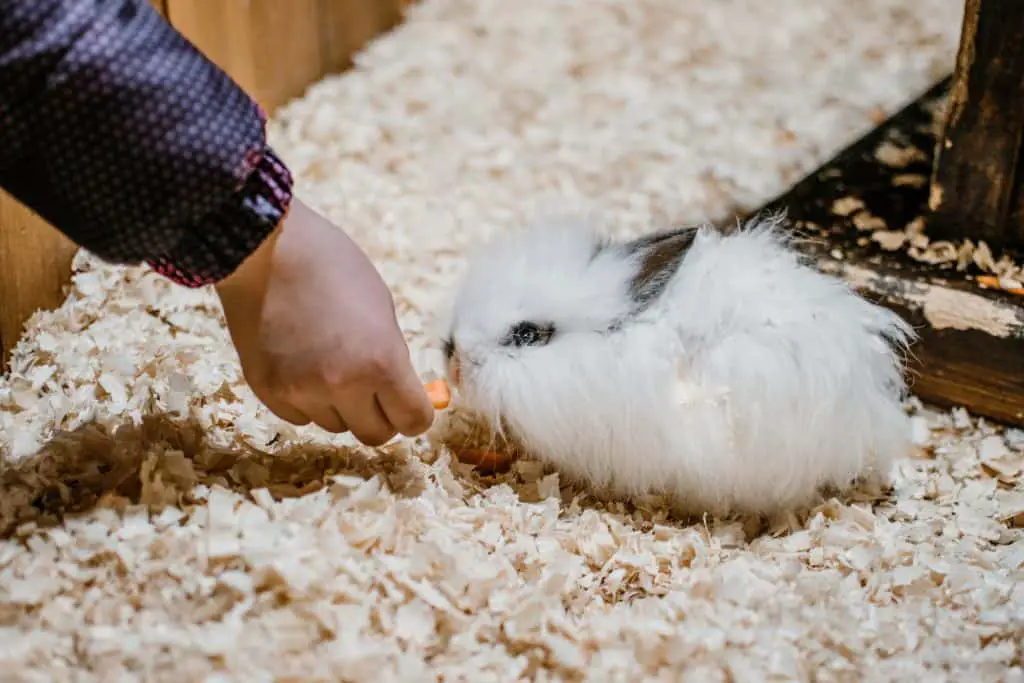
Suitable Vegetables & Fruits
Lionhead Rabbit’s Diet
Never give your Lionhead sugary treats and cooked food. They have a very sensitive stomach and will react negatively to it.
Also, if you notice your rabbit’s teeth have grown longer than usual, add more hay to the diet as it effectively files down the teeth.
Lastly, make sure that they have easy access to clean and fresh drinking water all the time.
Recommended Staple Foods





Lionhead Rabbit’s Housing
Despite the small size, your Lionhead will require a relatively bigger space. That’s because they’re an active breed and need to run around and play to burn off all that energy.
For a Lionhead, you need a hutch big enough to accommodate at least two rabbits of similar size.
It’s not uncommon to find pet parents not putting in much thought about the hutch they choose for their rabbits. Oftentimes, the hutch is far too small for rabbits and is not adequately sheltered from natural elements.
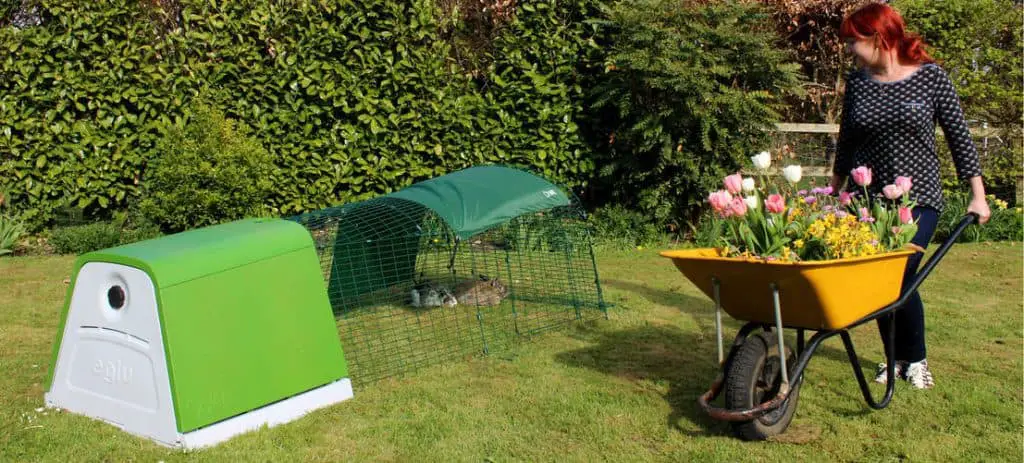
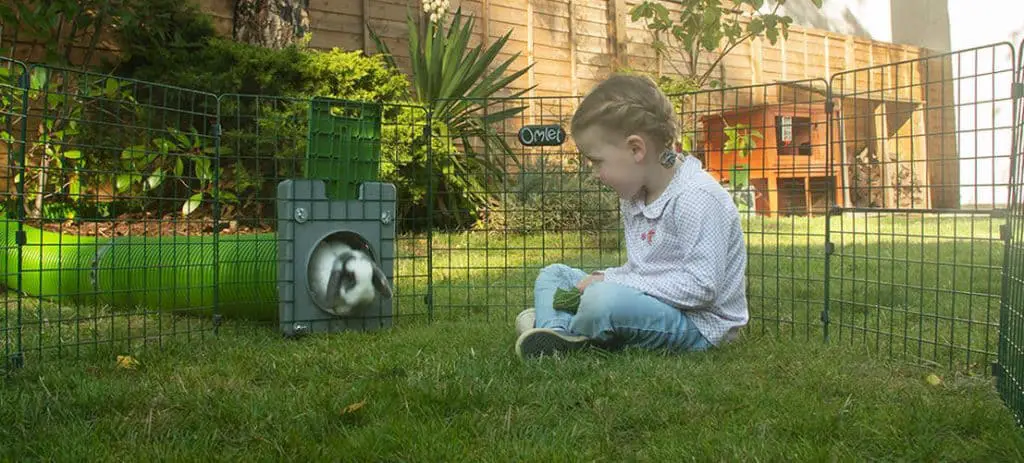
Rabbit Welfare UK’s Guidelines
Although there’s no one-size-fits-all rule, the guidelines set by Rabbit Welfare UK are suitable for most rabbit breeds, including Lionheads.
Rabbits should never be raised alone and require a company of their own kind. Thus, according to Rabbit Welfare, a hutch must accommodate at least 2 rabbits comfortably.
The hutch should allow at least two Lionheads to make at least 3 hops and lie stretched out. So, it means the hutch should be at least 6ft x 2 ft. The floor space has to be at least 2 feet from front to back. Likewise, the hutch should be 2 feet tall as well.
So, that’s 6 x 2 x 2 foot (1.8m x 0.6m x 0.6m)
Pen for Your Lionhead
Rabbits need to run, stretch, jump, dig, and forage. It is simply cruel to keep your Lionhead tucked in the hutch all the time. So, you can provide a run, too.
The run can be around 8 feet long. It’s even better if it’s connected to the hutch via a tunnel system. Make sure the run has enough space for toys, running, and digging tunnel.
Given the Lionhead’s thick fur and mane, they’re prone to overheating. The hutch and pen must be located in the shade, away from extreme temperature.
Lionheads can generally tolerate temperatures between 32° to 70° Fahrenheit, as long as they’re protected from humidity, rain, and wind.

Indoors vs Outdoors
Most houses have a temperature somewhere between 55° to 70° Fahrenheit. That’s ideal enough for a Lionhead rabbit. If your house is well-insulated and generally warm, make sure to place the hutch in a cool place.
Lionheads are more tolerant of colder climates compared to other breeds.
Nevertheless, make sure that the hutch is sheltered from the sun and rain. Also, raise the enclosure off the floor, so it stays dry.
Rabbits don’t react too well to being moved around from one environment to another. So, choose the location wisely and stick to it.
Breeding Lionhead Rabbits
Let us take a look at some information that will help you successfully breed Lionhead rabbits and care for their young.
Suitable Age
What’s better than a couple of Lionhead rabbits? A whole bunch of little Lionhead kits!
Most rabbits reach sexual maturity by the time they are 4 to 5 months. With miniature breeds like the Lionhead, your rabbits can sexually mature by the time they’re 4 months old.
For health and safety of Does, most breeders choose to wait until the rabbits have reached 5 ½ to 6 months of age before breeding.
Mating Behavior
For the mating purpose, it’s best to take the Doe to the Buck’s cage. If you do the opposite, the buck will be too busy marking his territory in the new cage. Now that will result in a territorial feud and no mating.
Once you introduce the Doe and Buck, it won’t take long before mating begins. The buck will mount the doe, and the two will remain ‘stuck’ for several minutes. After the buck grunts and lies down, you’ll know that the mating has been done successfully.
Unlike most small mammals, Lionhead doe rabbits don’t have a specific heat cycle. In fact, they are receptive to male rabbits throughout all seasons.
Also, ovulation doesn’t happen naturally. Copulation triggers it. Hence, your doe will ovulate and conceive a day or so after mating.
Mating Frequency
To amplify the chances of pregnancy, Lionhead breeders often mate their rabbits for a second time. Some choose to do so immediately after an hour or so, while some wait until 24 hours.
It entirely depends on your rabbits’ well-being and your preference. Either way, the success rate is higher if you let the Lionhead couple mate a couple of times!
Pregnancy lasts about 30-35 days, and your rabbit can become pregnant again within a couple of weeks.
Litter Size
The average litter size of a Lionhead rabbit is 2 to 4 kits.
How to Know if Your Lionhead Rabbit is Pregnant?
You can only find out that after about 2 weeks since mating. Gently hold the doe with one hand and feel the belly, right above the pelvis area. If the doe has conceived, you will feel multiple marble-sized embryos.
Caring for a Pregnant Lionhead Doe
It’s essential to fortify your pregnant Lionhead doe’s diet, as nutrients will be passed down to the kits. Your doe will require more protein-dense food than usual.
Alfalfa hay, rabbit pellets, and dark leafy greens can form the main diet, with the occasional addition of beneficial fruits and veggies.
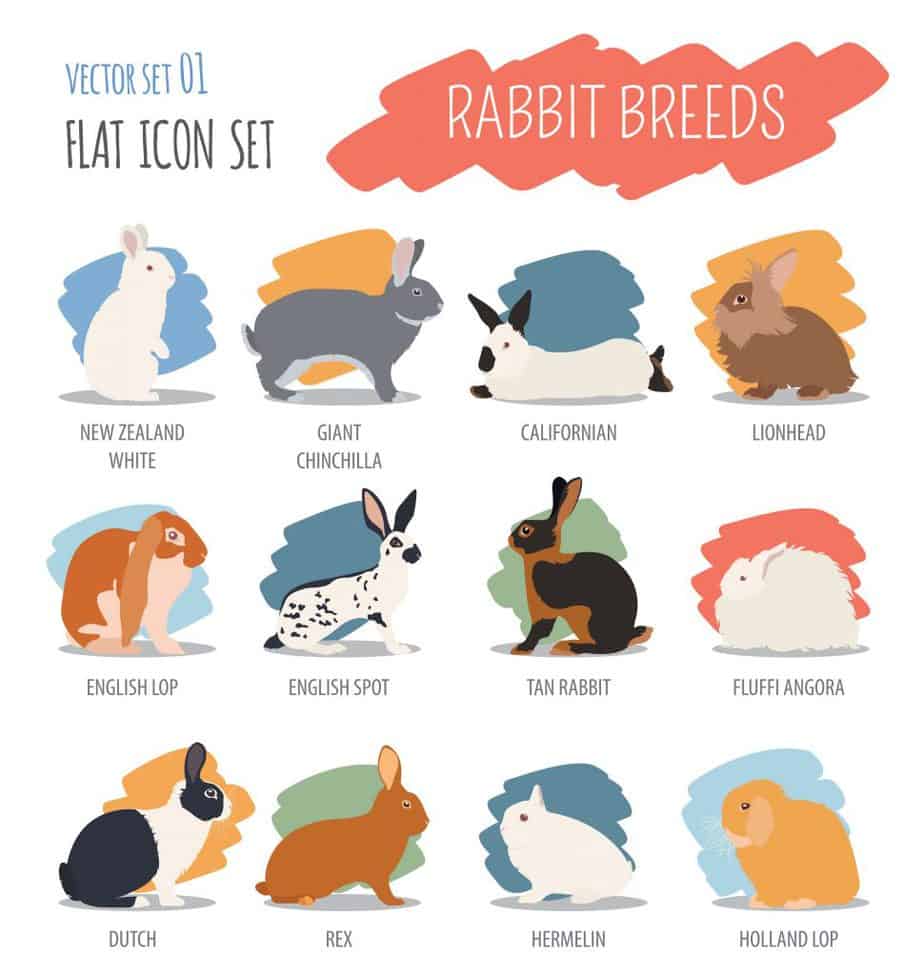
Care Guide for Lionhead Rabbits
Along with all the normal care and considerations that go into looking after a pet rabbit. There are some special watch-outs when caring and owning a Lionhead rabbit. Let us take a closer look.
Health Complications in Lionheads
- Dental Disorders
Most rabbits suffer from dental problems as the teeth grow throughout their lifetime.
But Lionheads are particularly susceptible to dental complications like mandibular prognathism due to a smaller head and a long jaw, which can cause misalignment and abnormal dental wear patterns. Watch out for signs like weight loss and dribbling.
- Parasites
During warm weather, rabbits are vulnerable to fly strike, where flies lay eggs on the fur, causing maggot infestation.
The chances are greater in Lionhead rabbits because of their long and dense fur. Unwell rabbits or those that aren’t grooming themselves are more prone to this condition. Treatment is viable when done quickly.
- Gastrointestinal Diseases
Rabbits predisposed to dental complications are naturally prone to gastrointestinal diseases as well. That’s because they’re quickly stressed and may lose their appetite.
As a result, the gut begins acting up when it doesn’t receive a fiber-rich diet. Be on a lookout for symptoms like hunched back, reduced bowel movement, and lethargy.
Medical intervention to treat the gut will involve antibiotics, motility drugs, and pain medication.
- Respiratory Problems
All rabbits have compact lung space and are exposed to lung infections. The risks are even higher for Lionheads as the roots of their upper teeth are positioned just below the sinuses.
Now, if the upper teeth and gums become inflamed, it can cause a sinus infection.
Other than that, your Lionhead is also prone to snuffles, characterized by rapid breathing, coughing, and a runny nose.
- Spinal Injury
Like all rabbits, your Lionhead has a very fragile spine. When frightened or shocked, the rabbit may abruptly kick out with its hind legs, resulting in spinal damage from the sudden jolt.
The spine can also be damaged because of mishandling or dropping. Symptoms can range from lethargy to paralysis in the hind legs.
Although medical treatment can’t completely reverse the damage, some procedures to correct it or anti-inflammatory drugs to ease the pain may help.
- Ingestion of fur
Lionheads shed quite a lot and are more prone to ingesting their fur than other breeds. Since rabbits can’t physically vomit, this could pose a problem.
The accumulation of the hair inside the stomach can slowly form a solid mass, hindering food movement through digestive tract. If you notice symptoms like increasingly small fecal droppings, don’t forget to contact the vet immediately.
How long will Lionhead rabbits live?
Most Lionheads live up to the age of 7-9 years.
Grooming Essentials for Lionhead Rabbits
Lionheads have a lot of fur, and it can get tangled and matted easily. If you have a single-mane rabbit, brushing the coat every other day would suffice. In the case of a double-mane rabbit, expect to brush the coat thoroughly every day.
If you don’t get rid of the dead hair through brushing, your bunny will probably ingest all that fur, causing a wool block.
In the winter, Lionheads grow a thick coat that falls off in the spring. So, brace yourself for some good spring cleaning.
Since Lionhead rabbits can be quite timid, we recommend you to introduce the brushing/grooming experience gradually and help your pet form a positive connection with it.
Keeping the sessions short and giving small treats can help the process.
The fluffy ears also come with additional risks of mites living in them. If your bunny is scratching its ear more than usual or if there’s fur loss around the area, it could be a telling sign of ear mites.
Make sure you check the ear area every time you brush your Lionhead’s coat.
We know rabbits to be the cleanest of household pets. They love to groom themselves multiple times a day. Now it can be tempting to bathe your Lionhead.
But it’s unnecessary for most conditions. Brushing will get rid of the dirt from your rabbit’s fur in most cases. The rest, the Lionhead will handle by licking itself clean.
Rabbits aren’t fond of water. And bathing can easily stress out your already timid Lionhead. Now, if a situation like diarrhea or urine scalding occurs, you can gently wipe the area with a soaked towel.
In addition to stress, bathing your rabbits can also cause respiratory infection and hypothermia. To put it simply, it’s best to avoid bathing your Lionhead at all costs.
Given a Lionhead rabbit’s smart nature, it will need toys to play with and keep itself occupied. If you fail to provide toys, they’ll resort to messing with your couch, carpet, and furniture!
You can give your rabbit anything from an untreated piece of wood to a hard-plastic toy with no choking hazard. But most importantly, Lionheads enjoy nothing more than exploring their surrounding on their own or playing with their mates.
Make sure that your rabbit has company of its own kind, and they receive fairly good doses of sunshine and fresh air every day.
You can provide your Lionheads with scratching posts to file down nails on their own, but you’ll have to clip their nails every 3-4 weeks using special clippers made for the exact purpose.
The temperament of a Lionhead Rabbit
The reason Lionheads are gaining traction as household pets is for their extremely likable personality. Not only are Lionheads lively and energetic, they also love human company and cuddles.
They love roaming around and playfully chase humans. That’s why they make great pets in homes with young children.
However, Lionheads are inherently timid and can feel threatened quite easily. Here are a few key points to keep in mind:
- Don’t pick your Lionhead rabbit unnecessarily
- Use minimum restrain while handling your rabbit
- Refrain from making loud or sudden sounds around your rabbit
Final Thoughts
Lionheads are famed for their unconventionally bold looks, but there’s more to this breed than its mane. They are smart, and quirky, and will form a special bond with you in no time.
Lionheads come with their own set of unique specialties and vulnerabilities.
Make sure you are ready and keep an open mind before bringing Lionheads rabbits to their forever home.


